Newsletter Issue 6 | Dec 2010
Florida Eye News and Views
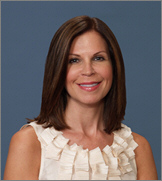
Dear Readers:
Is it just me or is time really slipping by at the speed of lightening? With the holidays upon us I’m sure everyone is busier than ever. However, that’s no excuse for putting off getting your annual eye exam!
At Florida Eye, we are urging all of you to pick up the phone and call your internist, your eye doctor and any other health care professional that you should see annually and make the time to take care of your health. The old adage “an ounce of prevention is worth a pound of cure” is very true, and the doctors here will back that up. In this newsletter you’ll read how an annual eye exam picked up a case of Open-Angle Glaucoma, and you’ll also be reminded about why it’s so important for a diabetic to have regular checkups.
We’ve also included a recent CDC report regarding the growing diabetes dilemma, exciting news about a new diabetes lifestyle show, and a Lucentis patient success story that won’t leave a “dry eye” in the house. In addition, there’s information for PBC optometrists for our upcoming CE, a report on our involvement with the Lions Club, the usual section with eye care questions and the latest cosmetic specials currently offered by Dr. Barry Schechter.
By all means, if you have any questions or comments please contact me at (561) 736-5050 or [email protected]. And just a reminder — you can request brochures and business cards through our website as well.
Wishing you a happy & healthy holiday season,

Gwen Cohan
Director of Marketing & Public Relations
In this Issue:
Dr. Katz Wins Best of Boynton Award — Again! »
Latest Diabetes News from the CDC »
Dr. Katz Featured in “This Sweet Life” Diabetes Lifestyle Show »
Dr. Schechter Explains the Benefits of SLT for Open-Angle Glaucoma »
Lions Club Eyeglass Collection Drive »
Continuing Education Seminars »
Dr. Katz Wins Best of Boynton Award — Again!
Dr. Randy Katz Wins Popular Local Award for Third Year in a Row

This past October Dr. Randy Katz, Florida Eye Microsurgical Institute’s Retinal and Macular Degeneration, Diabetic Retinopathy and Retinal Detachment Specialist, was chosen for the third year in a row as the “Best Medical Specialist” in Boynton Beach by Boynton Forum readers.
“I’m really honored and touched that Boynton Forum readers chose me as Best Medical Specialist in Boynton Beach again,” said Dr. Katz, “It’s an honor that I’d like to share it with our wonderful Florida Eye staff, because we work as a team, and they help me to do the best that I can for each and every one of my patients.”
With regards to the contest, ballots are sent out for six consecutive weeks to 35,000 readers each week, and mailed back to the office for entry each day. At the end of the contest they are tallied and the winners and nominees names are announced.
Current Clinical Trials
From Dr. Barry Schechter:
Studies for Dry Eye, Pterygium and Glaucoma patients
We are currently enrolling patients in several new studies in a variety of eye-concern areas. The purpose of all of the studies is to evaluate new and promising ways to treat and alleviate these conditions.
Mild to Moderate Dry Eye
We are evaluating a mild topical NSAID based upon my prior research.
Pterygium
Patients with moderate ptergia who may want to defer surgical intervention will be evaluated for use of Restasis. This study is also based on prior research that I have completed.
Glaucoma
Alternate administration of Glaucoma medications (Xalatan) via a reservoir in a punctual plug.
From Dr. Randy Katz:
We will be enrolling patients for a new study that will be using Combination RX of Lucentis and Ozurdex (long acting FDA approved steroid implant) in the next few months. The purpose of this study will be to determine if there is even more improvement when combining the two drugs. We will also be participating in one clinical trial for dry ARMD that we will start enrolling for in the fourth quarter of 2010.
As with any of our studies at Florida Eye, if you refer patients and they are enrolled, we will update you on the progress of your patient and return the patient to your care at the end of the study. The sponsor covers all expenses and costs of these trials. If you would like to discuss these studies further, please either contact me or our study coordinator Debbie Rankin at (561) 736-5055.
Latest Diabetes News from the CDC
According to the CDC, One-Third of Americans Will Have Diabetes by 2050

That means thousands more people will be dealing with potential blindness, says Dr. Randy Katz. Dr. Katz has been treating diabetic patients for more than 20 years in Palm Beach County, and because of his involvement in national clinical trial studies with Age Related Macular Degeneration (ARMD) and Diabetic Retinopathy, he is able to present qualifying patients with treatment options they might not otherwise be privy to, such as groundbreaking medical treatments that eliminate the need for unnecessary surgeries.
“I wish there was no need for the types of studies we participate in,” says Dr. Katz, “but the sad fact is that type 2 diabetes is on the rise, and that means more eye disease. I can’t stress enough that the sooner diabetics start getting annual eye exams, the better their chances are for preserving their vision.”
The American Academy of Ophthalmology mirrors Dr. Katz’s stand on regular eye exams, and reports that 95 percent of those with significant diabetic retinopathy can avoid substantial vision loss if they are treated in time.
For more information visit the Centers for Disease Control and Prevention.
Dr. Katz Featured in “This Sweet Life” Diabetes Lifestyle Show

In the segment with Dr. Katz, viewers were able to see firsthand the results of regular eye exams and the positive outcome two of his diabetic patients have had using breakthrough treatments.
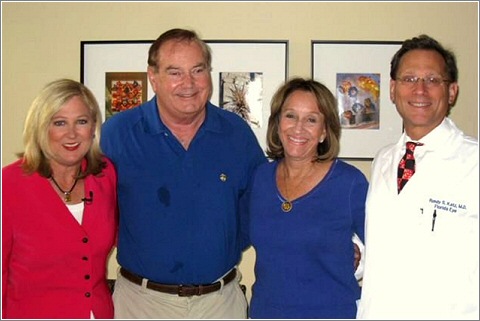
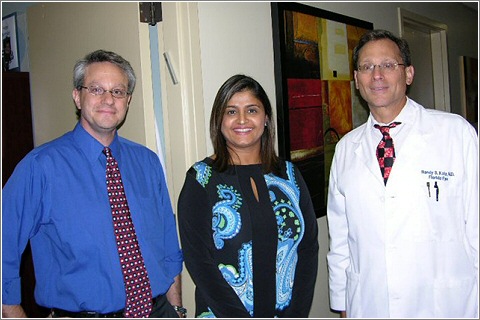
For more about the show visit the This Sweet Life website.
Patient Success Story
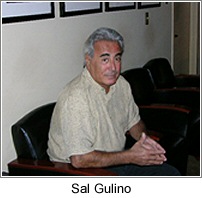
Kind of ironic for Sal, since he has spent a lifetime helping people to see better himself, as an optician in New Jersey.
After a thorough exam, Dr. Katz diagnosed Sal with diabetic retinopathy. “Sal had quite a bit of swelling and there was hemorrhaging as well,” explains Dr. Katz. “I decided the best possible course of action for him would be to get him started on bilateral Lucentis. In a matter of months on the drug, the former optician went from 20/100 ou to 20/25.
Dr. Katz has been administering Lucentis to Sal for about eight months, and the difference in his vision is like night and day. “It’s really incredible,” says Sal. “Before treatment, I had no real detail. I would look at a lawn and see a sea of green. Now, I can see each and every blade of grass — it’s amazing. And when I look at a plain wall, I can see the texture of the wall — also amazing.”
“Luckily we were able to arrange for Sal, who had no insurance, to receive bilateral Lucentis at no charge through the Lucentis Access Program,” says Dr. Katz. “That option may be available for other patients, or, if a patient who hasn’t had any previous types of treatments for their eye condition qualifies, they may be eligible to participate in our national clinical trial study. If they did qualify, their treatments with Lucentis (which normally costs about $2,000 per dose) would be administered at no charge, along with their medical visits and follow-up care.”
Sal is most appreciative of Dr. Katz’s efforts and says he will be eternally grateful. “Before I started Lucentis,” says Sal, “I felt like I was looking through a dirty window — I couldn’t see at all. Then as the months went by, I told Dr. Katz that there were patches of clean, clear window through all of the dirt. Now, eight months later I feel like the windows are sparkling clean.”
For more information about Lucentis or diabetic retinopathy in general, contact Study Coordinator Debbie Rankin at (561) 736-5055.
Dr. Schechter Explains the Benefits of SLT for Open-Angle Glaucoma
Annual Eye Exam Results in Early Diagnosis of Open-Angle Glaucoma — Treatment of Choice — SLT
When Alan Jacoby was sitting in Dr. Barry Schechter’s office for the first time, the last thing he expected to be told was that he had glaucoma. But after answering a few routine questions, Dr. Schechter took a medical history and conducted a physical examination of Alan’s eyes. It took only one visit and several tests for Dr. Schechter to come up with a diagnosis of Open Angle Glaucoma, which if left untreated, could have caused Alan to lose his eyesight — permanently.
Alan was very lucky to have been diagnosed when he was, and today his glaucoma is totally under control. And, because he chose to undergo a procedure called “Selective Laser Trabeculoplasty, or SLT,” he is currently living a medication free life.
Dr. Barry Schechter of Florida Eye Microsurgical Institute is one of the few doctors in Palm Beach County who performs SLT in the Institute’s office in Boynton Beach. He has been performing the procedure for the past two years. According to Schechter, who is the Institute’s Refractive Cataract Surgery, Glaucoma, Cornea & External Disease Specialist, SLT has become a common glaucoma treatment in his practice, for several reasons.
“Many of my patients are on multiple medications,” Schechter explains, “and often, they simply forget to take one or all of them. Also, for some patients, cost is an issue. Some are too expensive, and some drugs may not be covered by insurance.” Schechter adds that some patients exhibit sensitivities to using multiple medications. “With Selective Laser Trabeculoplasty, or SLT, we are often able to reduce the number of medications or eliminate glaucoma eye drops.”
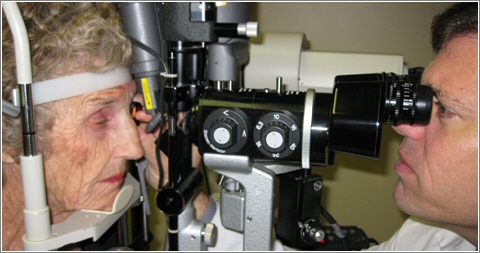
Another great advantage of SLT, “the laser procedure is done in the office, it takes about two minutes to complete and is painless,” says Schechter.

“When someone comes to our office, we always lay out every treatment available based on that particular patient’s glaucoma diagnosis. Some have no problem with the older, more traditional options — medications (eye drops), surgery — but more and more patients are opting, when possible, to have SLT,” says Dr. Schechter.
“We’ve been doing this procedure for two years now and treated over a thousand patients,” says Schechter. “We have a 95% success rate with SLT.” Schechter reports only one minor incident with SLT where a patient experienced minimal inflammation. “It was easily resolved with a topical treatment after two weeks. SLT is safe, effective and in my opinion an important treatment option available today for Open Angle Glaucoma patients.”
Alan is the first to agree with his doctor. “I hated the thought of having to use medication regularly. Because of having SLT, I don’t even think about having glaucoma.”
Lions Club Eyeglass Collection Drive

It is through organizations such as the Lions Club that millions of men, women and children are fitted year after year with recycled glasses, allowing some the chance to see clearly for the first time in their lives. Studying in school, reading for pleasure, going to work, running errands and simply handling day to day tasks are every day rituals most of us take for granted, but for the recipients of these glasses, being able to accomplish these tasks is a gift.
In a recent article published in the Sun Sentinel, Lions Club spokesperson Michael Melnick said that 30,000 pairs of glasses were collected in the state last year. “We sort them, and then have doctors discover what prescription they are and then give patients examinations. Every pair of glasses, if you can donate one pair and help one person, you are saving the world.” (See our press release for more information.)
Eyeglasses may be dropped off at any time during normal business hours, 8:30 a.m. to 5:00 p.m. at our Boca Raton, Boynton Beach and Wellington locations. This will be an ongoing service at Florida Eye and we urge all patients to drop off old or unused glasses at their convenience. For more information about the Lions Club and its many volunteer programs, visit the Lions Club website.
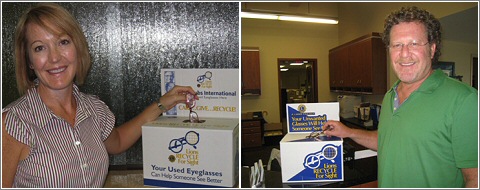
Continuing Education Seminars
If you enjoyed our last CE at Benvenutos in Boynton, you’re going to love our upcoming event at City Fish Market in Boca Raton! The evening will get underway at 6:30 p.m. with cocktails, followed by lectures and dinner at 7:00 p.m. We are very excited about this January 12th CE, as it will be the first time we are presenting an outside physician to discuss a new topic. Joining Florida Eye’s Dr. Barry Schechter, who will be presenting further updates on complicated anterior segment cases and their management will be Jamie Steinsapir, M.D., an associate with Palm Beach Diabetes & Endocrinology Associates. Dr. Steinsapir will present, “Onset of Diabetic Complications, Specifically Diabetic Retinopathy, & Update on Diabetes Management.”
Email invitations will be sent out the second week in December, and reservations for seating can be made at our website beginning December 8th (select “Continuing Eduction” under the “Physician Resources” button in our navigation bar). Reservations will also be accepted by calling (561)736-5050 or emailing [email protected]. Please have your license number and OE tracker number available to book the event.
Kosher meals will be available upon request with advanced notice, and dinner choices will be viewable online, with dinner orders taken at event. These courses will be COPE approved for two hours of continuing education credit.
We are also pleased to be sponsoring the upcoming PBCOA meeting on Tuesday, March 8th. Location to be announced!
Eye Care Questions
Dear Dr. Friedman:
Can my child wear contact lenses during sports activities?
Answer
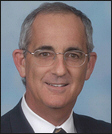
Yes, contact lenses provide excellent vision for most sports. However, they do not protect the eyes from injury. Therefore, contact lens wearers should use polycarbonate sports safety goggles or glasses when participating in sports. Also see information about preventing eye injuries.
Dear Dr. Gorscak:
Why does it seem like it’s getting harder and harder for me to read without glasses?
Answer
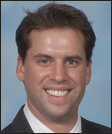
The ability to focus on near objects decreases steadily with age and is referred to as presbyopia. Presbyopia is a natural aging of the lens. It is usually near the age of 40. The best way to correct this condition is a visit to your eye doctor for a basic eye exam. If you indeed are diagnosed with presbyopia, your doctor will most likely prescribe glasses or bifocals to correct the imbalance.
Dear Dr. Chua:
My sister was just diagnosed as “legally blind.” What does this mean?
Answer
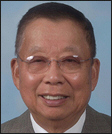
People like your sister are considered legally blind when the best corrected central acuity is less than 20/200 (perfect visual acuity is 20/20) in their better eye, or their side vision is narrowed to 20 degrees or less in their better eye. Even if your sister is legally blind, she may still have some useful vision. Also, if she is legally blind, she may qualify for certain government benefits.
Dear Dr. Katz:
I was diagnosed with type 2 diabetes about three years ago. I’m 51 and never had any real health problems to speak of. My wife keeps telling me it’s important to get my eyes checked every year, but I truly feel fine and have not had any problems with my vision. Why have my eyes examined when there is nothing wrong?
Answer

I can’t stress enough that the sooner diabetics start getting annual eye exams, the better their chances are for preserving their vision. You may feel fine and see fine now, but diabetics have different concerns than non-diabetic patients. Diabetics are at risk for Age Related Macular Degeneration (ARMD) and Diabetic Retinopathy, diseases that can result in permanent blindness if left undetected. The only way to prevent problems is with regular exams.
[The American Academy of Ophthalmology mirrors Dr. Katz’s stand on regular eye exams, and reports that 95 percent of those with significant diabetic retinopathy can avoid substantial vision loss if they are treated in time.]
Dear Dr. Schechter:
My brother was recently diagnosed with open-angle glaucoma and his doctor mentioned he was a good candidate for SLT — Selective Laser Trabeculoplasty. Can you tell me what that is? I’d hate for him to have any unnecessary surgery when he could be using drops every day.
Answer
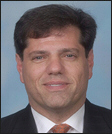
SLT does not rely on medicines. Instead, SLT uses an advanced laser system to target only specific cells of the eye — those containing melanin, a natural pigment. This allows for only these cells to be affected, leaving surrounding tissue intact. As a result, your body’s own healing response helps lower the pressure in your eye. SLT is an advancement over other lasers that have been used in the treatment of open-angle glaucoma for more than two decades. SLT is safe, effective and the results can last up to five years. Your brother would most likely not have to rely on daily medications for at least that long.
SLT is a very effective treatment and can be used in many different types and stages of glaucoma. SLT can be used for Primary Open Angle Glaucoma, Ocular Hyper Tension, Normal Tension Glaucoma, Juvenile Glaucoma, Aphakic Glaucoma and Pigmentary Glaucoma. SLT is a popular choice of treatment in my office.
Final Tidbits
Everyone at Florida Eye will truly miss Crystal Kasper, O.D., who recently left the practice to move to Jacksonville, where she and her fiancé will now reside. We wish you the best of luck in your new home!
And while it’s goodbye to Crystal, it’s hello to our newest staff members — Ophthalmologic Technicians Tony Lobacz and Ginny Calamita. Welcome to the Florida Eye family!
